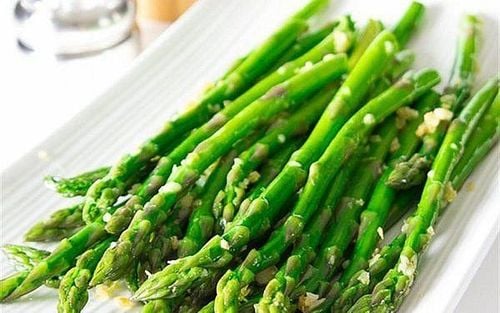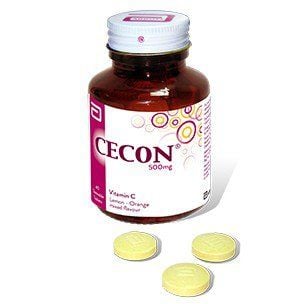When it comes to vegetables, asparagus is one of the most excellent choices. This is because asparagus not only provides a versatile source of nutrients but is also quite delicious. It is often used in cooked dishes.
1. Asparagus
In ancient times, asparagus was known as an aphrodisiac. This delicious and juicy vegetable contains a mix of stimulating nutrients that help boost energy, cleanse the urinary tract, and neutralize excess ammonia.
Asparagus is rich in vitamin K and folate (vitamin B9). Some nutrition researchers have noted that asparagus contains many anti-inflammatory nutrients and also provides antioxidants such as vitamin C, beta-carotene, vitamin E, and minerals like zinc, manganese, and selenium.
Moreover, this vegetable contains the amino acid asparagine, which is important for brain development and function. Asparagus also contains chromium, a trace mineral that helps insulin transport glucose. It is particularly rich in glutathione, a detoxifying compound that may help eliminate carcinogens. For this reason, asparagus may help combat or protect against certain cancers, including bone, breast, lung, and colon cancers.
Asparagus is extremely low in calories—just about 20 per serving (five spears), fat-free, and low in sodium. You can eat asparagus raw or cooked; however, cooking time affects its health benefits. A study published in the journal Food Chemistry examined blanching (cooking asparagus briefly in boiling water) and found significant differences in nutrient retention depending on the blanching duration. Generally, the longer asparagus is blanched, the more nutrients it loses, though cooking too briefly can make the stalks tough.
Additionally, the tips, middle sections, and bases of asparagus vary in their sensitivity to blanching times, with the tips losing nutrients the quickest. Therefore, the study's authors recommend blanching different sections of asparagus for varying durations to optimize nutrient retention.
2. Asparagus changes when cooked
The softer texture of cooked asparagus may not be its only advantage. Asparagus is rich in a group of chemical compounds called polyphenols, which are known for their strong antioxidant properties.
Research suggests that a diet rich in polyphenols can help reduce stress, inflammation, and the risk of certain diseases, including heart disease and diabetes.
Cooking green asparagus increases its total antioxidant activity by 16%. Specifically, cooking asparagus boosts the content of beta-carotene and quercetin—two powerful antioxidants—by 24% and 98%, respectively.
However, another study found that the antioxidant activity in cooked white asparagus is nearly three times higher than in raw asparagus.

3. The impact of processing on the nutritional value of asparagus
Although cooking asparagus can enhance the availability of certain compounds, it may reduce the levels of other nutrients. For example, a study found that cooking green asparagus decreases its vitamin C content—a nutrient particularly sensitive to heat—by 52%.
How specific nutrients in asparagus are affected by cooking depends on the cooking method, the duration of heat exposure, and the type of nutrient.
A general guideline for preparing asparagus is to choose cooking methods that limit exposure to water and heat, such as steaming, stir-frying, quick blanching, or microwaving. Additionally, avoid overcooking your vegetables and instead aim for a tender-crisp texture.
4. Choosing ways to use asparagus
Whether you cook asparagus or eat it raw, both options add fiber, antioxidants, and essential nutrients to your diet. What are the health benefits of eating raw asparagus? To fully take advantage of the health benefits that asparagus offers, you can incorporate both cooked and raw preparations into your eating habits.
You can try adding raw, finely chopped asparagus to pasta dishes and salads. Additionally, you can enjoy lightly steamed or stir-fried asparagus in a frittata or as a standalone side dish.

5. Risks of eating asparagus
There are no life-threatening side effects from eating too much asparagus, but there can be some uncomfortable side effects such as bloating and unpleasant-smelling urine. Additionally, you may also be allergic to asparagus, in which case you should avoid eating it. Those who are allergic to other members of the lily family, such as onions, garlic, and chives, are more likely to be allergic to asparagus. Symptoms may include: runny nose, rash, difficulty breathing, and swelling around the eyes, mouth, and lips.
Asparagus is one of the few foods that contains asparagusic acid. When this cleverly named chemical is digested, it breaks down into sulfur-containing compounds, which have a strong, unpleasant odor. These compounds are volatile, meaning they can evaporate and enter the air and your nose. Asparagusic acid itself is not volatile, so asparagus itself does not have a smell.
What’s stranger than a vegetable causing a foul smell? The fact that not everyone can smell or detect this odor. Scientists are also not entirely sure about this. Most evidence seems to show that not everyone can smell the odor, although some scientists believe not everyone produces it. In 2016, the medical journal The BMJ published a study where researchers examined data from the Nurses' Health Study, a large study involving nearly 7,000 European-descendant participants, to help determine if there is a genetic basis for detecting the asparagus odor. Over half of the participants could not smell it, and researchers found that genetic variations near odorant receptor genes were linked to the ability to detect the smell. Researchers suggest that treatments may be developed to turn “non-smellers” into “smellers,” thus increasing the ability to eat asparagus healthily.
Whether you can smell it or not, the smell in your urine has no harmful effects.
Asparagus, a highly nutritious vegetable, can be eaten cooked or raw. Because of its fibrous texture, cooking is the most common preparation method. However, thinly sliced or seasoned raw asparagus can bring an equally interesting flavor to dishes. Cooking asparagus can help boost the activity of antioxidants in asparagus, but this method can also contribute to the loss of nutrients, especially those vitamins sensitive to heat, such as vitamin C. To reap the greatest health benefits, consider incorporating both cooked and raw asparagus into your diet. That said, from a nutritional standpoint, you can’t go wrong with either option.
To arrange an appointment, please call HOTLINE or make your reservation directly HERE. You may also download the MyVinmec app to schedule appointments faster and manage your reservations more conveniently.
Reference source: healthline.com













